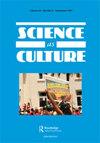Between People and Paper: Inhabiting Experiment in a Journal Club
IF 2.5
3区 哲学
Q1 CULTURAL STUDIES
引用次数: 0
Abstract
ABSTRACT In 2015, the Open Science Collaboration reported in the journal Science that a disturbingly large proportion of psychological studies cannot be replicated (Open Science Collaboration, 2015). The ensuing ‘reproducibility crisis’ became a lightning rod for contesting what counts as legitimate research, and for negotiating the relationship between communication infrastructures and research practice. In the psychological and cognitive sciences, the Open Science community has advocated widespread reforms to incentivize transparency, encourage replication, and detect and discourage questionable research practices. The model of ‘openness’ underlying mainstream Open Science centers on sharing information to increase science’s self-correcting capacity. Against the backdrop of broad-scale transformations in Open Science, this case study depicts how scientists read. By examining the activity of a group of researchers ‘virtually witnessing’ an experiment together, this study reveals reading as a non-trivial process that matters for how research is apprehended and for how science is moved through time and space. The case complicates a disembodied, information-centric ‘openness’ pursued by mainstream Open Science reforms and advocates integrating situated and embodied resources into methods reforms, beginning with practices of reading.人与纸之间:期刊俱乐部的居住实验
摘要2015年,开放科学协作组织在《科学》杂志上报道称,令人不安的是,大量心理学研究无法复制(开放科学协作,2015)。随之而来的“再现性危机”成为了质疑什么是合法研究以及谈判通信基础设施和研究实践之间关系的避雷针。在心理和认知科学领域,开放科学界主张进行广泛的改革,以激励透明度,鼓励复制,并发现和阻止可疑的研究实践。主流开放科学的“开放”模式以共享信息为中心,以提高科学的自我纠正能力。在开放科学大范围变革的背景下,本案例研究描述了科学家如何阅读。通过研究一群研究人员一起“虚拟见证”实验的活动,这项研究揭示了阅读是一个非琐碎的过程,它对如何理解研究以及科学如何在时间和空间中移动至关重要。这起案件使主流开放科学改革所追求的无实体、以信息为中心的“开放”变得复杂,并主张从阅读实践开始,将情境和具体资源整合到方法改革中。
本文章由计算机程序翻译,如有差异,请以英文原文为准。
求助全文
约1分钟内获得全文
求助全文
来源期刊

Science As Culture
Multiple-
CiteScore
5.20
自引率
3.80%
发文量
28
期刊介绍:
Our culture is a scientific one, defining what is natural and what is rational. Its values can be seen in what are sought out as facts and made as artefacts, what are designed as processes and products, and what are forged as weapons and filmed as wonders. In our daily experience, power is exercised through expertise, e.g. in science, technology and medicine. Science as Culture explores how all these shape the values which contend for influence over the wider society. Science mediates our cultural experience. It increasingly defines what it is to be a person, through genetics, medicine and information technology. Its values get embodied and naturalized in concepts, techniques, research priorities, gadgets and advertising. Many films, artworks and novels express popular concerns about these developments. In a society where icons of progress are drawn from science, technology and medicine, they are either celebrated or demonised. Often their progress is feared as ’unnatural’, while their critics are labelled ’irrational’. Public concerns are rebuffed by ostensibly value-neutral experts and positivist polemics. Yet the culture of science is open to study like any other culture. Cultural studies analyses the role of expertise throughout society. Many journals address the history, philosophy and social studies of science, its popularisation, and the public understanding of society.
 求助内容:
求助内容: 应助结果提醒方式:
应助结果提醒方式:


